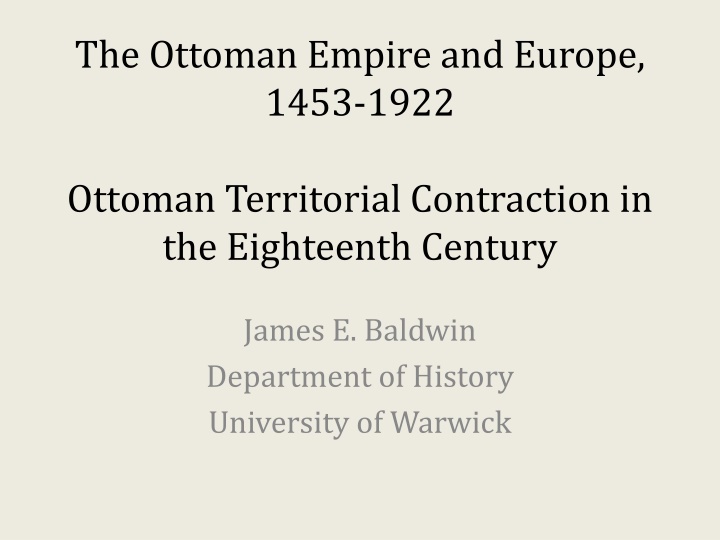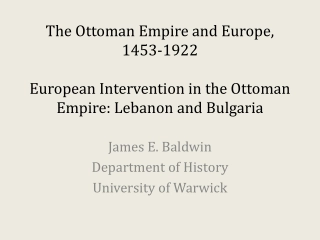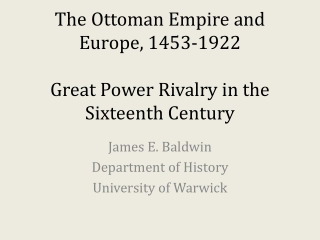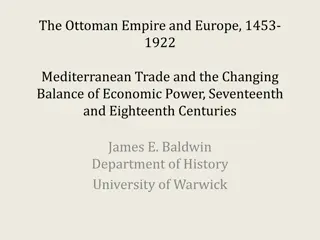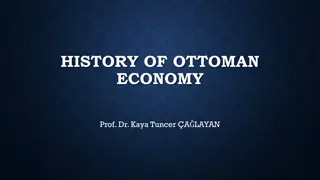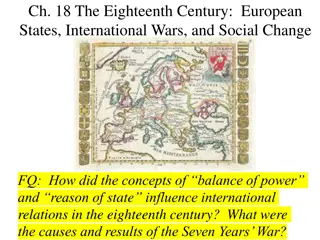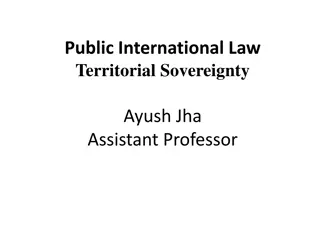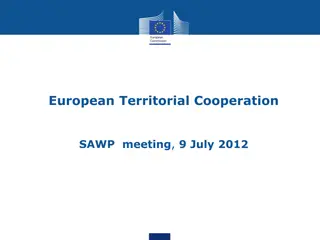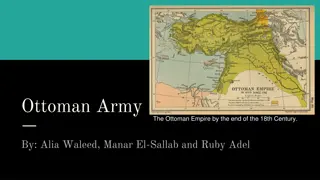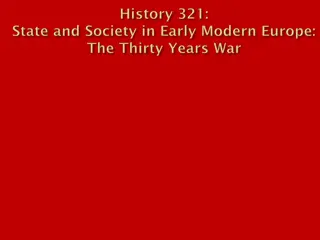Ottoman Empire Territorial Contraction in the 18th Century
Ottoman Empire faced agricultural and fiscal crises in the 17th century, leading to internal rebellions. However, by the mid-17th century, the empire had recovered and experienced further expansion, albeit at a slower rate compared to the previous century. In the 18th century, the Ottomans suffered significant territorial losses to the Habsburg Monarchy and Russia, leading to a shift towards diplomatic negotiations for preserving their territory. Treaties during this period marked fundamental changes in Ottoman international relations.
Download Presentation

Please find below an Image/Link to download the presentation.
The content on the website is provided AS IS for your information and personal use only. It may not be sold, licensed, or shared on other websites without obtaining consent from the author.If you encounter any issues during the download, it is possible that the publisher has removed the file from their server.
You are allowed to download the files provided on this website for personal or commercial use, subject to the condition that they are used lawfully. All files are the property of their respective owners.
The content on the website is provided AS IS for your information and personal use only. It may not be sold, licensed, or shared on other websites without obtaining consent from the author.
E N D
Presentation Transcript
The Ottoman Empire and Europe, 1453-1922 Ottoman Territorial Contraction in the Eighteenth Century James E. Baldwin Department of History University of Warwick
The Seventeenth Century In first half of century, Ottoman Empire faced agricultural and fiscal crises and internal rebellions By the middle of the century, the empire had recovered, and there was further expansion in Crete and Podolia Rate of expansion much slower than sixteenth century: empire was approaching natural limits of expansion
The Eighteenth Century Ottomans suffered major territorial losses, particularly to their chief rivals the Habsburg Monarchy and Russia Diplomatic service increased in importance within the empire, as the Ottomans sought to preserve their territory through negotiation rather than military victory The treaties of the eighteenth century entailed fundamental changes in Ottoman attitudes to international relations
The Great Turkish War, 1683-99 War between the Ottoman Empire and a coalition of the Habsburgs, Holy Roman Empire, Poland, Venice and Russia Ottomans besiege Habsburg capital Vienna Relief force led by King Jan III of Poland breaks siege Ottomans lose significant territory, especially at Battle of Mohacs in 1687 and Battle of Zenta in 1697
Treaty of Karlowitz, 1699 Peace conference held at Karlowitz, Serbia, during late 1698 and early 1699 Uti possidetis: territory currently held is starting point for negotiation Ottomans lost Bosnia, most of Hungary and part of Temesvar to Habsburgs Ottomans lost Podolia to Poland and Dalmatia and Peloponnese to Venice Truce agreed with Russia; Treaty of Constantinople in 1700 gave Azov to Russians
First half of 18thcentury Ottomans reasonably successful in wars of the first half of the 18thcentury Regained Azov from Russia in war of 1710-11 In 1714-18, regained Peloponnese and defended Crete against Venice, but lost remainder of Temesvar, central Serbia and part of Wallachia to Habsburgs 1735-39: Ottomans regained most of territory lost to Austria in 1718; surrender Azov to Russia, but Russians may not fortify it
Second half of 18thcentury Russo-Ottoman war of 1768-74: Russians advance deep into Moldavia and Wallachia, occupying Bucharest, routing Ottoman army at Kartal Treaty of Kucuk Kaynarca is humiliation for Ottomans: Karbadia in north Caucasus ceded to Russia, Crimea declared independent, Russia allowed Black Sea fleet, Russia claims protectorship over Ottoman Christians Russo-Ottoman war of 1787-92 fails to reverse Kucuk Kaynarca; Treaty of Jassy cedes Yedisan to Russia and confirms Russian annexation of Crimea France invades and occupies Egypt in 1798
The significance of Karlowitz Significant territories lost: 60,000 sq miles to the Habsburgs Ottomans formally conclude a permanent peace, and agree borders, for the first time This entails acceptance of international law, and abandonment of the gazi tradition This causes friction with Ottoman subjects in frontier regions, particularly the Tatars of the Crimea and Caucasus
Why relative military decline in the 18thcentury? Traditional argument: inherent conservatism of Muslims made the Ottomans unwilling to copy infidel innovations and unable to innovate themselves Recent scholarship disproves this: in the field of military technology, the Ottomans kept pace with European developments Ottomans were not able to imitate European military reforms such as conscription and drill This was due to the entrenched political power of the military regiments, who resisted reforms that would affect their interests
